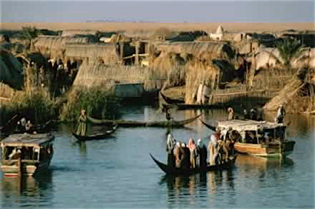
Ancient marshlands in southeastern Iraq drained by Saddam Hussein have rebounded to nearly half their former area, and progress should continue despite turmoil currently rocking the nation, U.N. officials said on Thursday.
The marshlands, believed by some to be the location of the biblical Garden of Eden, once totalled an area nearly the size of Wales and provided a resting spot for thousands of wildfowl migrating between Siberia and Africa.
“Good news out of Iraq is not very common these days,” said Robert Bisset, press officer for the United Nations Environment Programme, at a news conference announcing the results of the first phase of a marshlands restoration project funded by Japan.
“Everything isn’t perfect in the marshlands, but there are some very positive stories,” he added.
The marshes were the homeland of Iraq’s Marsh Arab people, who had inhabited the marshlands at the confluence of the Euphrates and Tigris rivers for thousands of years.
Saddam, though, accused the Marsh Arabs of desertion and fighting against his forces during the 1980-1988 war with Iran and of harbouring criminals and dissenters, and he ordered the area to be dammed and drained.
After Saddam’s downfall, local residents destroyed many of the dams, freeing the water. Their efforts were supplemented by the U.N.-led restoration project, which has enabled the marshes to rebound to nearly half their former area and prompted the return of thousands of birds and fish.
A second phase of the U.N.-led project began earlier this year and is being funded by Japan and Italy.
It’s great to see the US-led coalition achieving something productive and welcomed by the Iraqi people.
What’s that? It’s a UN-led project — with the Japanese and Italians.
Oh.















Saddam drained the Garden of Eden?! Now we know the real reason so many religious nuts in this country wanted war in Iraq.
Well, the UN has to do something worthwhile at least once a decade.
#2 — a shame that neocons can’t come up to that standard.
Chatting with folks “around the ranch” this morning — no one was surprised to hear about this sort of progress. No one was surprised to hear the U.S. has nothing to do with it, either.
Bush and Blair are too busy patting each other on the butt for ignoring the advice of stodgy old crocks like Baker and Hamilton.
3, quit Blaming others and FIX IT yourself…Pointing fingers, never gets anything done.
I would wonder Why it was drained int he first place…
Mosquitoes?? Flies?? Plague??
Useing the water to raise Poppies?? Drugs?? MJ??
giving an oasis for ANYONE that wishes a Land invasion?
And where was the water diverted to??
saving the waterfowl from being decimated by hungery villages?
#5, didn’t read the article OR the post, eh?
Yes I did…
QUOTE:
Saddam, though, accused the Marsh Arabs of desertion and fighting against his forces during the 1980-1988 war with Iran and of harbouring criminals and dissenters, and he ordered the area to be dammed and drained.
He dammed the water, but where was it draining to??
And the south is where they grow Drug crops, or didnt you know that??
ECA, bro’ — I don’t mean to chuckle (too much) over your generalities; but, “drug crops” and “they” — presumes you can specify what drug crops and whoever the “they” is you’re referring to.
Folks have been studying the lives of Arabs in this region going back 5,000 years and they had continued to be essentially pastoral people with grazing animals and subsistence crops through all of that history.
Wetland is not a great place to grow either opium poppies or marijuana. While both can benefit from irrigation — neither grows well with wet feet. Ask a farmer. No doubt you can find someone up North who’s grown a little jimson weed.
The projects have moved halfway to restoring an eco-system and a lifestyle that has existed satisfactorily for millenia. The only thing left to disturb it is the potential for oil reserves beneath those marshes — a possible reason for the benign neglect intended by our invading army — thwarted by other nations (and the UN) who sought to restore the culture destroyed by Hussein.
As for where the water went — well, Hussein tried to push it mostly at Basrah. The natural tendency would have been in the direction of Esfahan in Iran — but, with his hatred for the Shi’a and Iranians in general, that had to be thwarted, as well.
Everyone in Basrah was (and is — under the Brits) making a good enough Euro off oil exports not to worry about becoming drug barons.
Why speculate? You can read for yourself from someone who actually was there. Rory Stewart’s “The Prince of the Marshes: And Other Occupational Hazards of a Year in Iraq” is a fine read.
http://news.bbc.co.uk/2/hi/middle_east/4541387.stm
Dude — so, read what you linked to. Iraq is a “transit” route. No one’s claiming the stuff is grown in the Euphrates-Tigris Basin.
Be glad these poor buggers are getting some of their old life and land back. They’ve been dumped on enough.